Top Rankings
William Penn School District ranks among the top 20% of public school district in Pennsylvania for:
Category
Attribute
Community Size
Largest student body (number of students) (Top 1%)
For the 2025 school year, there are 8 public elementary schools serving 2,362 students in William Penn School District. This district's average elementary testing ranking is 2/10, which is in the bottom 50% of public elementary schools in Pennsylvania.
Public Elementary Schools in William Penn School District have an average math proficiency score of 11% (versus the Pennsylvania public elementary school average of 35%), and reading proficiency score of 28% (versus the 54% statewide average).
Minority enrollment is 95% of the student body (majority Black), which is more than the Pennsylvania public elementary school average of 42% (majority Hispanic and Black).
Overview
This School District
This State (PA)
# Schools
11 Schools
2,145 Schools
# Students
4,504 Students
1,108,977 Students
# Teachers
330 Teachers
82,943 Teachers
Student : Teacher Ratio
14:1
14:1
District Rank
William Penn School District, which is ranked within the bottom 50% of all 675 school districts in Pennsylvania (based off of combined math and reading proficiency testing data) for the 2021-2022 school year.
The school district's graduation rate of 79% has increased from 77% over five school years.
Overall District Rank
#587 out of 684 school districts
(Bottom 50%)
(Bottom 50%)
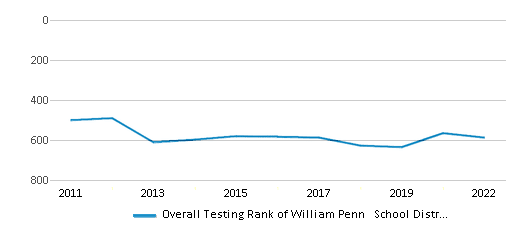
Math Test Scores (% Proficient)
10%
36%
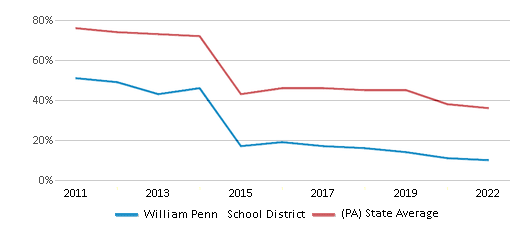
Reading/Language Arts Test Scores (% Proficient)
30%
55%
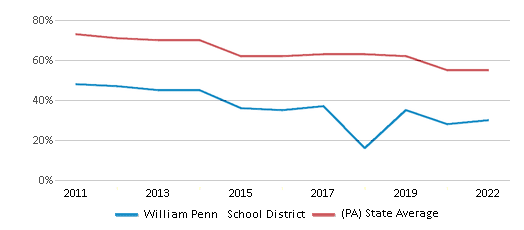
Science Test Scores (% Proficient)
30%
57%
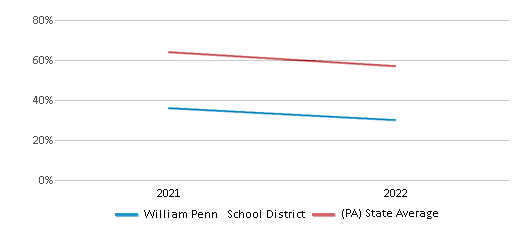
Graduation Rate
79%
87%
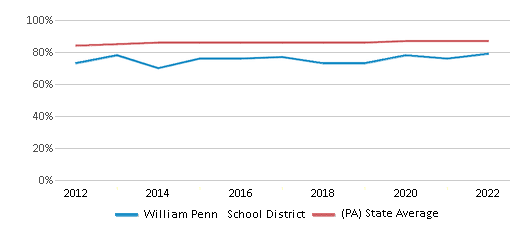
Students by Ethnicity:
Diversity Score
0.27
0.61
# American Indian Students
27 Students
2,278 Students
% American Indian Students
1%
n/a
# Asian Students
67 Students
51,838 Students
% Asian Students
1%
5%
# Hispanic Students
159 Students
173,776 Students
% Hispanic Students
4%
16%
# Black Students
3,850 Students
169,696 Students
% Black Students
85%
15%
# White Students
190 Students
645,871 Students
% White Students
4%
58%
# Hawaiian Students
8 Students
965 Students
% Hawaiian Students
n/a
n/a
# Two or more races Students
203 Students
63,991 Students
% of Two or more races Students
5%
6%
Students by Grade:
# Students in PK Grade:
-
7,744
# Students in K Grade:
307
110,287
# Students in 1st Grade:
333
120,767
# Students in 2nd Grade:
339
126,133
# Students in 3rd Grade:
314
120,907
# Students in 4th Grade:
343
125,574
# Students in 5th Grade:
332
126,000
# Students in 6th Grade:
394
126,698
# Students in 7th Grade:
289
94,854
# Students in 8th Grade:
346
93,972
# Students in 9th Grade:
405
16,255
# Students in 10th Grade:
374
14,467
# Students in 11th Grade:
372
12,872
# Students in 12th Grade:
356
12,447
# Ungraded Students:
-
-
District Revenue and Spending
The revenue/student of $24,955 is higher than the state median of $23,696. The school district revenue/student has grown by 5% over four school years.
The school district's spending/student of $24,587 is higher than the state median of $23,119. The school district spending/student has grown by 5% over four school years.
Total Revenue
$112 MM
$39,541 MM
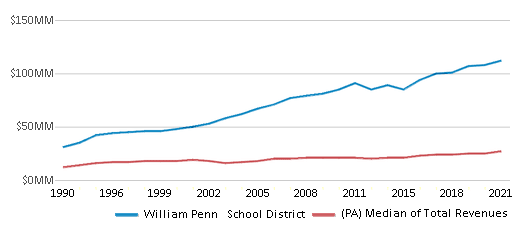
Spending
$111 MM
$38,578 MM
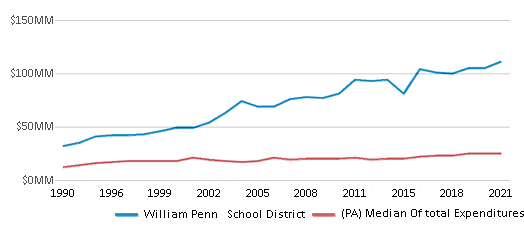
Revenue / Student
$24,955
$23,696
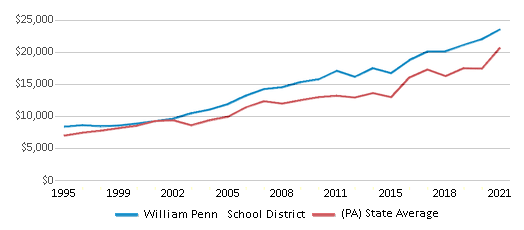
Spending / Student
$24,587
$23,119
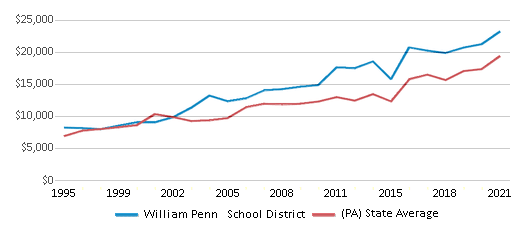
Best William Penn School District Public Elementary Schools (2025)
School
(Math and Reading Proficiency)
(Math and Reading Proficiency)
Location
Grades
Students
Rank: #11.
W B Evans Elementary School
Magnet School
(Math: 15-19% | Reading: 35-39%)
Rank:
Rank:
2/
Bottom 50%10
900 Baily Rd
Lansdowne, PA 19050
(610) 623-5975
Lansdowne, PA 19050
(610) 623-5975
Grades: K-6
| 303 students
Rank: #22.
Colwyn Elementary School
(Math: 15-19% | Reading: 30-34%)
Rank:
Rank:
2/
Bottom 50%10
211 Pine Street
Darby, PA 19023
(610) 957-5470
Darby, PA 19023
(610) 957-5470
Grades: K-6
| 157 students
Rank: #33.
Aldan Elementary School
(Math: 15-19% | Reading: 25-29%)
Rank:
Rank:
2/
Bottom 50%10
1 North Woodlawn Ave
Clifton Heights, PA 19018
(610) 626-3410
Clifton Heights, PA 19018
(610) 626-3410
Grades: K-6
| 234 students
Rank: #44.
Ardmore Avenue Elementary School
(Math: 12% | Reading: 33%)
Rank:
Rank:
2/
Bottom 50%10
161 Ardmore Ave
Lansdowne, PA 19050
(610) 623-7900
Lansdowne, PA 19050
(610) 623-7900
Grades: K-6
| 545 students
Rank: #55.
East Lansdowne Elementary School
(Math: 10-14% | Reading: 30-34%)
Rank:
Rank:
2/
Bottom 50%10
401 Emerson Ave
Lansdowne, PA 19050
(610) 626-2415
Lansdowne, PA 19050
(610) 626-2415
Grades: K-6
| 286 students
Rank: #6 - 76. - 7.
Bell Avenue School
(Math: 6-9% | Reading: 20-24%)
Rank:
Rank:
1/
Bottom 50%10
1000 Bell Ave
Lansdowne, PA 19050
(610) 284-6100
Lansdowne, PA 19050
(610) 284-6100
Grades: K-6
| 240 students
Rank: #6 - 76. - 7.
Park Lane Elementary School
(Math: 6-9% | Reading: 20-24%)
Rank:
Rank:
1/
Bottom 50%10
1300 Park Ln
Darby, PA 19023
(610) 534-4880
Darby, PA 19023
(610) 534-4880
Grades: K-6
| 312 students
Rank: #88.
Walnut Street Elementary School
(Math: 3% | Reading: 18%)
Rank:
Rank:
1/
Bottom 50%10
224 South Sixth Street
Darby, PA 19023
(610) 534-5660
Darby, PA 19023
(610) 534-5660
Grades: K-6
| 285 students
Recent Articles

Year-Round Or Traditional Schedule?
Which is more appropriate for your child? A year-round attendance schedule or traditional schedule? We look at the pros and cons.

Why You Should Encourage Your Child to Join a Sports Team
Participating in team sports has a great many benefits for children, there is no doubt. In this article you will learn what those benefits are.

White Students are Now the Minority in U.S. Public Schools
Increasing birth rates among immigrant families from Asia and Central and South America, combined with lower birth rates among white families, means that for the first time in history, public school students in the United States are majority-minority. This shift in demographics poses difficulties for schools as they work to accommodate children of varying language abilities and socio-economic backgrounds.





